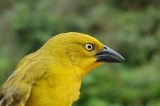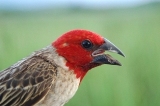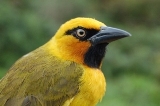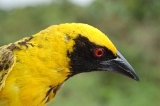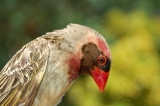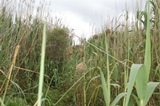PAPER: Birds in hedges 2013-03-11 (339)
Usieta HO, Manu SA, Ottosson U. 2013. Farmland conservation in West Africa: how do hedgerow characteristics affect bird species richness? Bird Study 60(1):102-110.
Capsule. The value of farmland for birds at a site in Nigeria, West Africa, was highly dependent upon the habitat structure, with wider and more continuous hedges supporting more bird species.
Aim. To understand the value of hedges in Nigerian farmland to bird species richness.
Methods. We used line transects to survey birds and vegetation on 166 systematically selected hedgerows on fallow, cultivated and harvested fields in Jos East, Nigeria.
Results. Wider hedges supported higher species richness. Plant species composition was a weak predictor of bird species richness compared to hedge width. There was no observed difference in distribution of bird richness across field types, suggesting that the value of hedgerows for biodiversity is comparable, regardless of farming method. Continuous hedgerows (hedgerows with vegetation gap <1.5 m) held higher species richness compared with discontinuous (hedgerows with vegetation gap>1.5 m) hedges.
Conclusion. This result suggests that hedge size and structure, rather than plant species composition, is an important predictor of avian species richness in hedgerows surrounding farmland. Therefore, the value of farmland for birds in this part of Africa is highly dependent upon the habitat structure, with wider and more continuous hedges supporting more bird species.

Bird surveys were carried out from May to June 2008 at the beginning of the wet season. The table below shows the frequency of occurrence of weaver species in hedges. Frequency is the number of occurrences of a species over 166 hedgerow plots; Percent is the percentage of hedgerow plots where the species was recorded.
Northern Red Bishops were found in hedges less often than most of the other weaver species, but when they did occur they were in large flocks. The Village Weaver is the weaver species most often found in hedges.
| Species | Frequency | Percent | No. of individuals |
| Black-winged Bishop Euplectes hordeaceus | 19 | 11 | 26 |
| Chestnut-crowned Sparrow Weaver Plocepasser superciliosus | 7 | 4 | 14 |
| Heuglin's Masked Weaver Ploceus heuglini | 2 | 1 | 5 |
| Little Weaver Ploceus luteolus | 21 | 13 | 30 |
| Speckled-fronted Weaver Sporopipes frontalis | 21 | 13 | 57 |
| Northern Red Bishop Euplectes franciscanus | 3 | 2 | 163 |
| Village Weaver Ploceus cucullatus | 32 | 19 | 67 |
| Vitelline Masked Weaver Ploceus vitellinus | 17 | 1 | 30 |
Literature as featured in Weaver Watch news items
|
